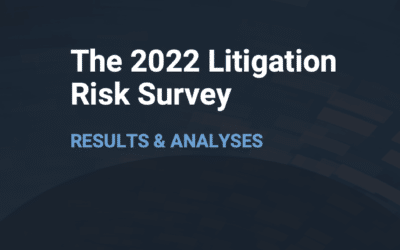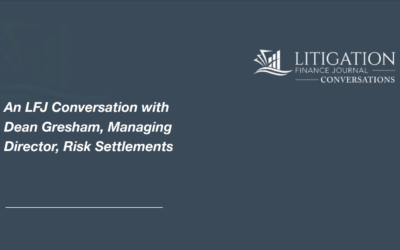In July 2021, Risk Settlements co-presented a PLI webinar on how litigation buyout insurance (LBO insurance) can help keep companies “deal ready.” Following up on that presentation, we thought a brief article detailing the nuts and bolts of litigation buyout insurance might help those interested in pursuing such a policy to determine if it is right for them. Below, we have outlined some of the most common questions we receive about the logistics behind LBO insurance and our thoughts on each.
What Is LBO Insurance?
LBO insurance is an insurance product through which the insurer agrees, in exchange for a premium, to take on the financial risks and liabilities associated with a known, threatened, or existing class action, antitrust, or non-class case at any time prior to a final settlement. It is like buying fire insurance, only instead of doing so to cover the risk of a fire, you do so because you already know your house is on fire. The only remaining question is how much damage (or loss) will there be?
Every LBO policy is for an amount certain. In other words, even if you want to insure an active litigation for “all the case is worth,” due to applicable insurance regulations, you cannot ask for an open-ended policy that covers all loss from a case. Rather, you must decide in advance exactly how much coverage you are looking for.
It goes without saying that every LBO policy is individually tailored, designed to help a company achieve its business, financial, and legal objectives. But if you are thinking about procuring LBO insurance, you should consider both the amount of coverage you may need and how you’d like to structure the policy, including the age-old question of retention vs. premium.
Policies are customized to address the unique legal issues facing a particular company and can be crafted to address a full spectrum of unique litigation risks. Once a policy is in place, the insurance carrier may take over defense of a case and pay defense costs, covers any adverse judgments or fee awards, or both.
Can LBO Insurance Be Used to Protect against Lawsuits That Have Not Yet Been Threatened or Filed?
The short answer: yes.
One paradigm example sticks out. In 2020, a private equity owned human resources company was finalizing a sale when it received a letter from a plaintiff’s attorney threatening a wage and hour lawsuit. The company promptly disclosed the letter to the potential buyer, after which the potential buyer expressed serious reservations about completing the transaction. The selling company, in consultation with its lawyers, estimated the potential exposure at $11 million.
At this point in time, the selling company turned to Risk Settlements to determine if there was an insurance-based solution that would assuage the buyer. After diligencing the case, weighing the risks, and evaluating comparable cases (and settlements) involving the same plaintiff’s counsel, Risk Settlements was able to price the risk. For less than $3 million, the company was able to procure a policy covering more than its estimated exposure, thereby giving the buyer the comfort it needed to close the sale. The transaction was saved.
What Are Some Common Exclusions from an LBO Insurance Policy?
A common question companies often ask is what costs—incurred by a company in the normal course of litigation—are not covered by the LBO insurance policy? The following are some standard exclusions that an insurer generally will not cover:
- Settlements entered into without the insurer’s consent;
- Costs above a certain (negotiated) materiality threshold incurred without the insurer’s consent;
- “Overhead” costs related to litigation cooperation (i.e., the insurer will not pay for employee time cooperating (e.g. a 30(b)(6) deposition)) or traditional overhead expenses (e.g. photocopies); and
- Loss arising from the insured’s failure to cooperate.
Who Decides Whether to Settle a Matter?
This is an issue also addressed in the policy itself. In our experience, negotiations surrounding the power to settle a matter are often the most contentious and involved. From the insurer’s perspective, it does not want the obligation to settle a matter at a significant loss if a better outcome can be salvaged. And from the insured’s perspective, it wants to be able to help drive a matter to its conclusion to try and minimize distraction stemming from litigation. So how does this play out?
The following questions help guide the discussion as the insurer and the insured consider their positions:
- Will a settlement be purely monetary or will there likely be an injunctive relief component?
- Will the company be required to admit wrongdoing as part of a likely settlement, and if so, could this cause harm in other ancillary matters?
- Could a sizable settlement encourage either future private litigation or follow-on regulatory investigations?
The answers to these questions (among others) will help the parties think through how they view settlement and which party (insurer or insured) should control the decision.
Why Would a Party Purchase LBO Insurance?
Simply put, the most frequent reason cited by companies looking for LBO insurance is that (a) a third party (e.g., a potential acquiror) is concerned about a litigation exposure; (b) the third party is unwilling to act (e.g. complete an acquisition) unless and until the risk is abated; and (c) there is either insufficient time or interest to settle the matter promptly.
For those looking to close an M&A transaction, LBO insurance offers certain advantages over the alternatives. Yes, sometimes a large escrow can make the buyer comfortable, but that ties up the money for the life of the litigation, which can often go on for years. And overpaying for a quick settlement to make the case go away will take cash out of seller’s pocket and leave the buyer in worse fiscal shape. LBO insurance is far superior to both.
What Are Common Issues That Bother Insurance Carriers Looking to Provide Coverage?
When considering whether to insure, insurance carriers place a premium (pun intended) on candor. Companies looking to transfer exposure should always be upfront with material risks related to the matter. Unfortunately, and all too frequently, we have received submissions where potentially problematic—but potentially solvable—issues are not disclosed at all, only to be discovered during diligence through a Google search. Such omissions of clear red flags can do irreparable harm to the process, leaving the insurer unable to trust the potential insured and unlikely to offer coverage.
What Type of Information Do LBO Insurance Carriers Need Before Deciding Whether to Offer Terms?
The following is a non-exhaustive list of materials that the carrier may require before deciding on the matter:
- Current counsel’s analysis of the merits, case status, and potential damages;
- Current counsel’s budget; and
- The history (if any) of settlement negotiations.
One benefit of seeking out LBO insurance—even if the company does not ultimately purchase it—is the opportunity to have another set of eyes review the risk a company is facing. Indeed, not just any set of eyes, but those of an entity looking to back the risk financially. In our experience, the insurer’s assessment can help focus the company on the strengths and weaknesses of the case, all of which inures to the company’s benefit as it proceeds with litigation (either with or without insurance coverage).
***
Ultimately, LBO insurance can be adapted to fit a wide array of complex litigation issues. It can help remove obstacles from the path of deals and assist companies to prepare for a sale. And at its core, it aims to take uncertainty off the books and allow companies to move forward with transactions that will help them grow and thrive.
This article has been published in the PLI Chronicle: Insights and Perspectives for the Legal Community, https://bit.ly/3fMTISg.






